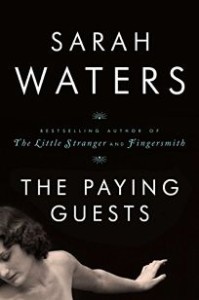
After the carnage of the Great War, many women in England found themselves condemned to spinsterhood. That’s not why in 1922 Frances Wray remains unmarried and living with her mother in South London, where their lives are circumscribed by the endless domestic chores, church on Sundays, and occasional visits with a few friends.
Frances does the domestic work, her mother being elderly and still grieving for the loss of her sons in the war. They once had a servant, but after the death of Frances’s father, the two women discovered that he had left them nothing but debts. By the time of the story, they have decided that their only recourse is to take in lodgers, dressing up the idea by calling them paying guests.
Enter Lillian and Leonard Barber. Members of the “clerk class,” they take up residence in the newly created apartment on the second floor and quickly change the atmosphere of the house, with their lively music and visits from Lillian’s rambunctious, working class family. Still the Wray women are more puzzled than distressed. What upsets the applecart is Frances’s growing attraction to Lillian.
The author brilliantly captures the peculiar intimacy of families sharing a wall, something I’m familiar with from living in rowhouses, triple-deckers, and a duplex (aka semi-detached). You try not to listen, but nonetheless find yourself having an unwelcome familiarity with their routines. Sometimes you even speculate about what’s going on over there.
Vividly captured as well is the domestic life of the period. The author gives us enough of Frances’s routine to understand what a burden housework was before the “labor-saving” devices we are accustomed to, without letting those passages become boring. She does this by exquisite detail, carefully chosen, and sometimes by making them part of action scenes.
I was surprised and impressed by the author’s handling of the class differences between the three families. Though never coming out and saying something like They are not our sort, Mrs. Wray remains aloof from the Barbers and Lillian’s family. However, Frances begins to enter the lives of both and seems to be free of that sort of class consciousness.
In fact, the psychological portrayal of Frances is what helped me stick with this overlong book. A fascinating character to start with, Frances changes with exposure to new information or outlooks, each transformation believable within the story.
The other thing that kept me going was the narrator Juliet Stevenson, one of my favorite actors. Having her voice in my ear is always a pleasure.
Who are your favorite audiobook narrators?